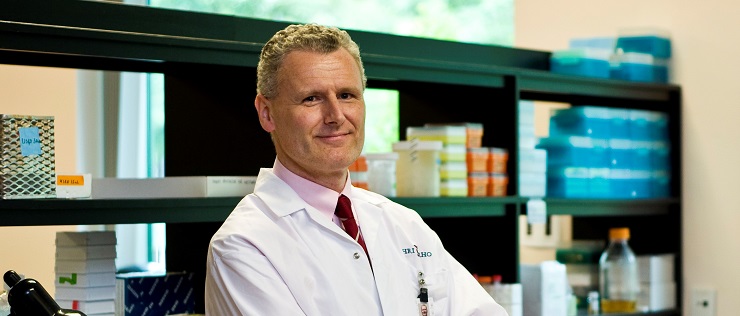 Dr. Michael Schlossmacher grew up in Austria, trained at Harvard and now leads The Ottawa Hospital’s neuroscience research program. His research helped establish a key concept in Alzheimer’s disease and led to a clinical trial of an experimental therapy for Parkinson’s. He is now investigating the link between Parkinson’s and immune system. He will receive the Grimes Research Career Achievement Award from the hospital on October 28, 2017.
Dr. Michael Schlossmacher grew up in Austria, trained at Harvard and now leads The Ottawa Hospital’s neuroscience research program. His research helped establish a key concept in Alzheimer’s disease and led to a clinical trial of an experimental therapy for Parkinson’s. He is now investigating the link between Parkinson’s and immune system. He will receive the Grimes Research Career Achievement Award from the hospital on October 28, 2017.
As a young medical student in Austria, Michael Schlossmacher and his fellow students had to prepare a report on the possible causes of stomach ulcers. They stuck with all the conventional theories and got a good grade, but the report turned out to be totally wrong. At the time, evidence was just starting to emerge that stomach ulcers could be caused by a bacterium, but the establishment did not want to hear it. It was just too radical. When the truth came to light, Dr. Schlossmacher resolved that he would never again accept medical dogmas without questioning them and he wouldn’t be afraid to investigate opposing ideas. This approach has led to many surprising and important discoveries, netting Dr. Schlossmacher the 2017 Grimes Research Career Achievement Award from The Ottawa Hospital.
After completing his medical training, Dr. Schlossmacher obtained a scholarship to visit Harvard University in Boston. With his mentor, Dr. Dennis Selkoe, he studied amyloid-beta protein, which accumulates in the brains of people with Alzheimer’s disease. He discovered that this protein is produced by all cells in the body, a revolutionary finding that is now a cornerstone of our understanding of Alzheimer’s.
In 2006, Dr. Schlossmacher was recruited to The Ottawa Hospital and the University of Ottawa, attracted in part by Ottawa’s collaborative, multi-disciplinary Parkinson’s Research Consortium. He eventually assumed leadership of the hospital’s neuroscience research program and founded the University of Ottawa’s MD-PhD program.
In recent years, Dr. Schlossmacher has pioneered the still-to-be-proven theory that Parkinson’s could be triggered by an infection, particularly in people who are genetically at risk. This is based partly on large, long-running human observational studies and partly on molecular studies of two Parkinson’s-associated genes, called alpha-synuclein and LRRK2.
“If the theory is correct, it would mean Parkinson’s could be triggered by an infection decades before motor symptoms actually develop,” said Dr. Schlossmacher. “We think that select infections in the gut or nose might cause the innate immune system to malfunction, and this could eventually lead to inflammation in the brain and damage of critical nerve cells. If proven correct, this would allow us to predict who may develop Parkinson’s in later years. It would also provide hope for new treatments for this still incurable disease.”
Dr. Schlossmacher and his team have made other important discoveries. For example, they dissected the pathway that links alpha-synuclein and GBA1. This led to a clinical trial of an experimental therapy for Parkinson’s in 2017.
His team also developed a spinal fluid test for alpha-synuclein that is now used in all large observational studies of Parkinson’s progression. Dr. Schlossmacher says his scientific approach is inspired by his patients, rooted in teamwork, and fuelled by a willingness to challenge widespread assumptions, whether they be his own, or someone else’s.
“My mother always taught me to be daring and to reassemble the pieces of a puzzle to see whether we can create a different view, and thus a better understanding of a problem,” said Dr. Schlossmacher. “That’s something I love doing more than anything.”
Dr. Schlossmacher’s research is supported by generous donations to The Ottawa Hospital, particularly through the Bhargava Research Chair in Neurodegeneration. He is also supported by the Canadian Institutes of Health Research, the Ontario Brain Institute, the Michael J. Fox Foundation, Parkinson Canada, the Weston Brain Institute and the Parkinson Research Consortium.
The Ottawa Hospital: Inspired by research. Driven by compassion
The Ottawa Hospital is one of Canada’s largest learning and research hospitals with over 1,100 beds, approximately 12,000 staff and an annual budget of over $1.2 billion. Our focus on research and learning helps us develop new and innovative ways to treat patients and improve care. As a multi-campus hospital, affiliated with the University of Ottawa, we deliver specialized care to the Eastern Ontario region, but our techniques and research discoveries are adopted around the world. We engage the community at all levels to support our vision for better patient care. See www.ohri.ca for more information about research at The Ottawa Hospital.
University of Ottawa: —A crossroads of cultures and ideas
The University of Ottawa is home to over 50,000 students, faculty and staff, who live, work and study in both French and English. Our campus is a crossroads of cultures and ideas, where bold minds come together to inspire game-changing ideas. We are one of Canada’s top 10 research universities—our professors and researchers explore new approaches to today’s challenges. One of a handful of Canadian universities ranked among the top 200 in the world, we attract exceptional thinkers and welcome diverse perspectives from across the globe. www.uottawa.ca
Media Contact
Jennifer Ganton Director, Communications and Public Relations Ottawa Hospital Research Institute Office: 613-798-5555 x 73325 Cell: 613-614-5253 jganton@ohri.ca
